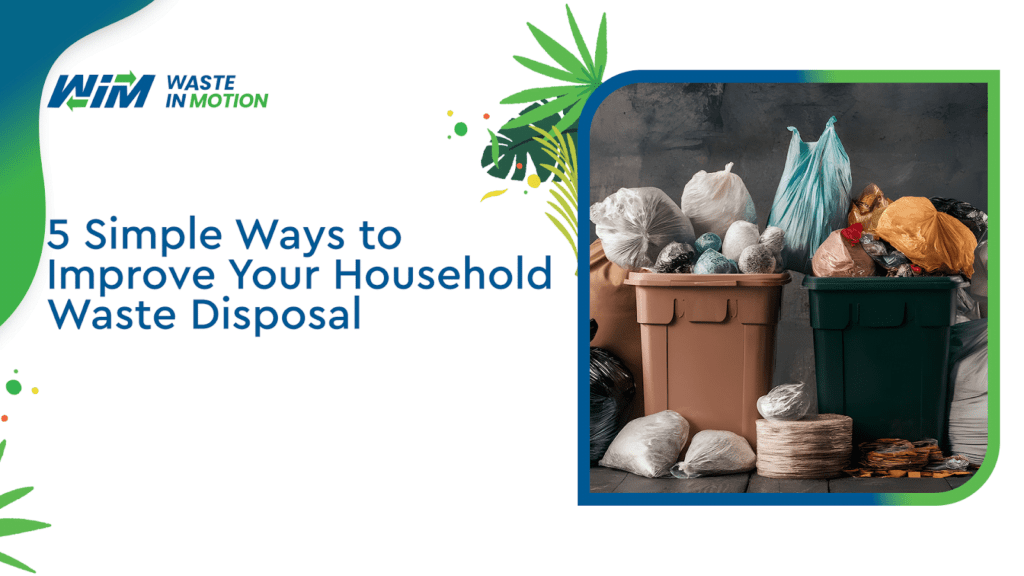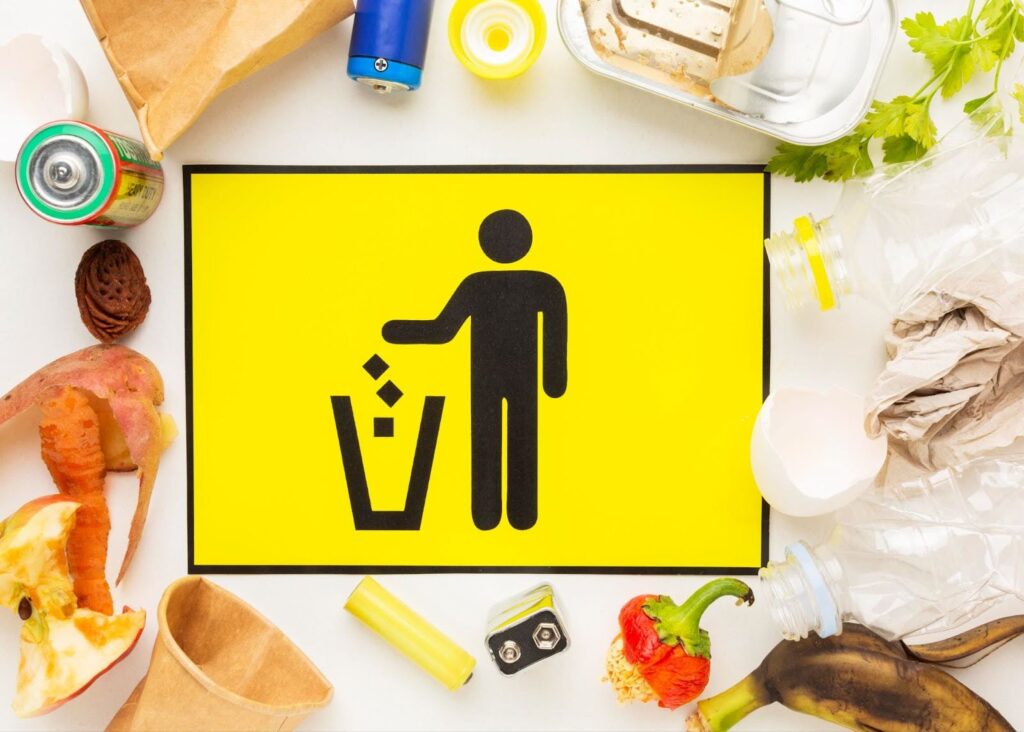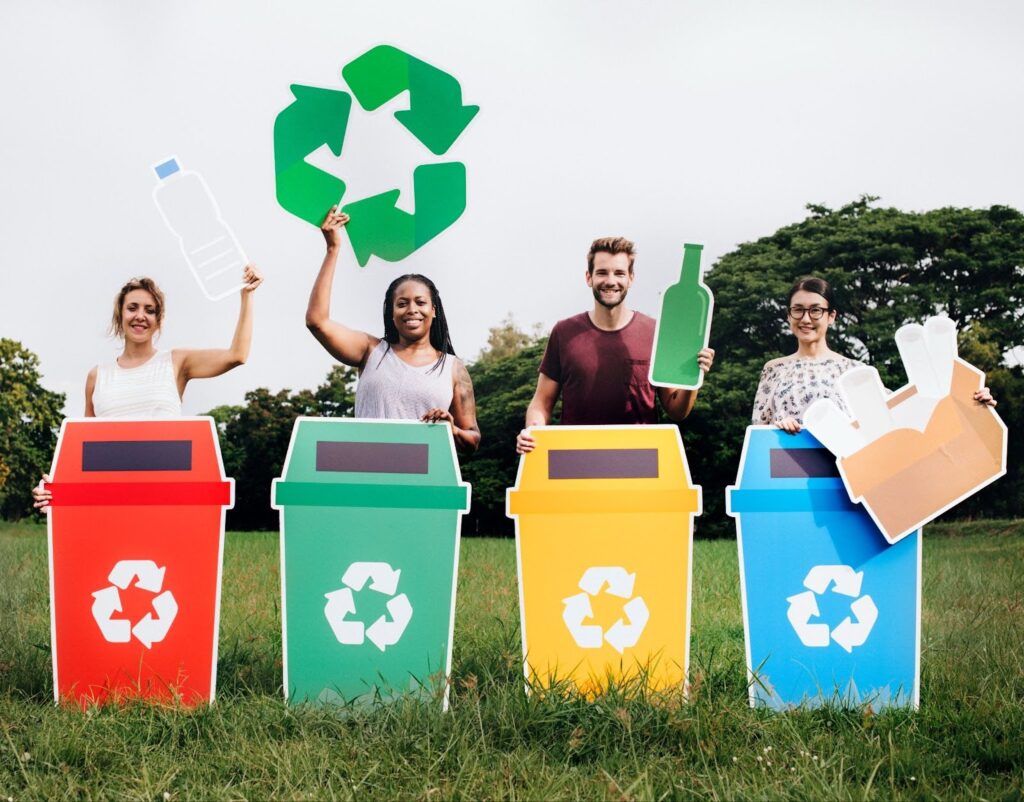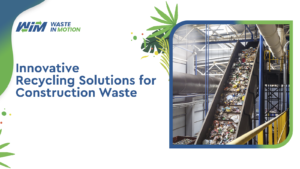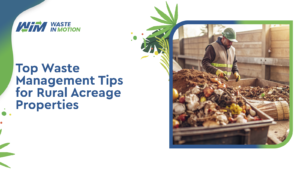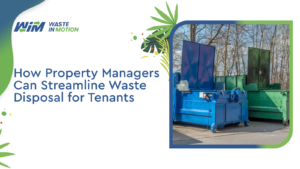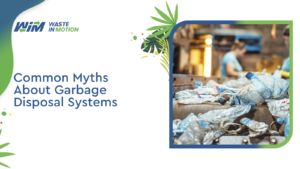Household waste disposal is a crucial aspect of maintaining a healthy home environment and contributing to broader environmental sustainability. With increasing awareness of the environmental impact of waste, it’s more important than ever to adopt effective waste management practices at home.
This article outlines five simple ways to improve your household waste disposal, helping you reduce waste, recycle more effectively, and contribute to a healthier planet.
Table of Contents
ToggleThe Importance of Household Waste Disposal
Effective household waste disposal is vital for both personal health and environmental sustainability. Improper waste management can lead to pollution, attract pests, and pose serious health risks to your family and community. On a larger scale, poor waste disposal practices contribute to environmental degradation, including soil contamination, water pollution, and increased greenhouse gas emissions. By improving how we manage waste at home, we can reduce our environmental footprint and support a cleaner, healthier world.
Understanding the Basics of Waste Management
What is Household Waste?
Household waste, also known as domestic waste, encompasses all the waste generated within a household. This waste can be categorized into several types:
- Organic Waste: Includes food scraps, yard waste, and other biodegradable materials that can be composted.
- Recyclable Waste: Consists of materials like paper, cardboard, glass, metals, and certain plastics that can be processed and reused.
- Hazardous Waste: Comprises items such as batteries, chemicals, and electronic devices that require special disposal methods due to their potential harm to the environment and human health.
Understanding these categories is the first step in improving household waste disposal practices, as it allows for better segregation and management of waste streams.
Five Simple Ways to Improve Your Household Waste Disposal
1. Reduce Waste at the Source
One of the most effective ways to manage household waste is to reduce it at the source. This involves making conscious choices that minimize waste production. Here are some practical tips:
- Buy in Bulk: Purchasing products in bulk reduces the amount of packaging waste generated. It also often saves money in the long run.
- Avoid Single-Use Items: Opt for reusable items instead of single-use products. For example, use cloth bags instead of plastic bags and reusable water bottles instead of disposable ones.
- Choose Products with Less Packaging: Select products with minimal or recyclable packaging. This simple habit can significantly reduce the amount of waste you generate.
By adopting these practices, you can greatly reduce the volume of waste that needs to be managed, making your household waste disposal process more efficient.
2. Start Composting
Composting is a natural process that turns organic waste into nutrient-rich soil. Starting a compost bin at home is a great way to manage organic waste while producing valuable compost for your garden. Here’s how you can start:
- Choose a Compost Bin: You can purchase a compost bin or build one yourself. Ensure it’s placed in a well-drained, accessible area.
- Collect Organic Waste: Gather food scraps, yard waste, and other biodegradable materials. Avoid adding meat, dairy, and oily foods, as they can attract pests.
- Maintain the Compost: Regularly turn the compost to aerate it and speed up decomposition. Keep it moist, but not too wet.
Composting reduces the amount of waste sent to landfills and provides a sustainable way to recycle nutrients back into the soil, promoting healthy plant growth.
3. Recycle Properly
Recycling is a key component of waste management, but it’s important to do it correctly to ensure that materials can be effectively processed. Here are some tips for improving your household recycling:
- Sort Your Recyclables: Separate recyclables from non-recyclables. Common recyclable materials include paper, cardboard, glass, metal, and certain plastics. Check your local recycling guidelines to ensure you’re sorting correctly.
- Clean and Dry: Rinse out food and beverage containers before recycling. Contaminated recyclables can spoil entire batches, making them non-recyclable.
- Understand What Can’t Be Recycled: Not all plastics are recyclable, and items like plastic bags, Styrofoam, and certain food wrappers often cannot be processed in standard recycling facilities. Knowing what can’t be recycled helps prevent contamination of recyclable materials.
4. Dispose of Hazardous Waste Safely
Hazardous household waste requires special disposal methods to prevent environmental contamination and protect public health. Items like batteries, chemicals, and electronics should never be thrown in the regular trash. Here’s how to manage them safely:
- Use Designated Drop-Off Sites: Many communities have designated drop-off sites for hazardous waste. Check with your local waste management authorities to find out where you can safely dispose of items like batteries, paints, and chemicals.
- Participate in Collection Events: Some municipalities host special hazardous waste collection events. These are excellent opportunities to safely dispose of hazardous materials.
- Proper Storage: Until you can dispose of hazardous waste, store it safely in labeled containers, away from children and pets.
By following these practices, you help prevent toxic substances from entering landfills, water sources, and the broader environment.
5. Participate in Community Waste Programs
Engaging with community waste programs is a great way to improve your household waste disposal practices while supporting local initiatives. These programs often include recycling drives, hazardous waste drop-offs, and educational workshops that provide valuable information on sustainable living. Here’s how you can get involved:
- Join Local Recycling Programs: Participate in your community’s recycling program to ensure that your recyclables are processed correctly. Some programs even offer incentives for households that recycle effectively.
- Attend Educational Workshops: Many communities offer workshops on topics like composting, recycling, and sustainable living. These events are great opportunities to learn new waste management skills and share knowledge with others.
- Volunteer in Cleanup Events: Participate in local cleanup events to help remove litter from public spaces and promote a cleaner environment.
Getting involved in community programs not only improves your own waste disposal practices but also contributes to broader efforts to protect the environment and public health.
The Environmental and Health Benefits of Proper Waste Disposal
Protecting the Environment
Proper waste disposal has significant environmental benefits. By reducing waste, recycling, and composting, we can lower carbon emissions, conserve natural resources, and reduce the need for landfill space. Effective waste management practices also prevent pollutants from contaminating soil and water, which helps protect ecosystems and biodiversity. You can read more about the importance of waste management in protecting the environment.
Improving Public Health
Proper waste disposal practices are essential for protecting public health. By minimizing waste and disposing of hazardous materials safely, we reduce the risk of pollution, which can lead to serious health problems such as respiratory issues, waterborne diseases, and exposure to toxic substances. Effective waste management in reducing pollution involves adopting strategies that prevent harmful pollutants from entering our environment. Implementing these best practices at home not only keeps your family safe but also contributes to the well-being of your community.
Common Challenges in Household Waste Disposal
Overcoming Recycling Confusion
Recycling confusion is a common challenge for many households. Misunderstandings about what can and cannot be recycled often lead to contamination of recycling streams, which can result in entire batches being sent to landfill. To overcome this challenge, it’s important to stay informed about local recycling guidelines and educate yourself on proper recycling practices. Consider attending community workshops or seeking resources from reliable sources.
Dealing with Limited Space for Waste Separation
Limited space can make waste separation difficult, especially in smaller homes or apartments. Here are some tips for managing waste in tight spaces:
- Use Compact Bins: Invest in compact recycling and compost bins that fit easily into small spaces.
- Stackable Solutions: Look for stackable storage solutions that allow you to separate waste without taking up too much room.
- Community Facilities: If space is very limited, consider using community composting facilities or recycling drop-off points to manage your waste more effectively.
By finding creative ways to manage waste in small spaces, you can still implement effective waste disposal practices without compromising your living area.
Conclusion
Recap of Key Points
Improving your household waste disposal doesn’t have to be complicated. By adopting these five simple strategies—reducing waste at the source, starting composting, recycling properly, disposing of hazardous waste safely, and participating in community waste programs—you can significantly improve your home’s waste management practices. These actions not only contribute to a cleaner, healthier environment but also help protect public health and promote sustainable living.
Now is the time to take action! Start implementing these waste disposal strategies today and make a positive impact on the environment and your community. By making small changes at home, you can contribute to a larger movement toward sustainability and a healthier planet for future generations.


